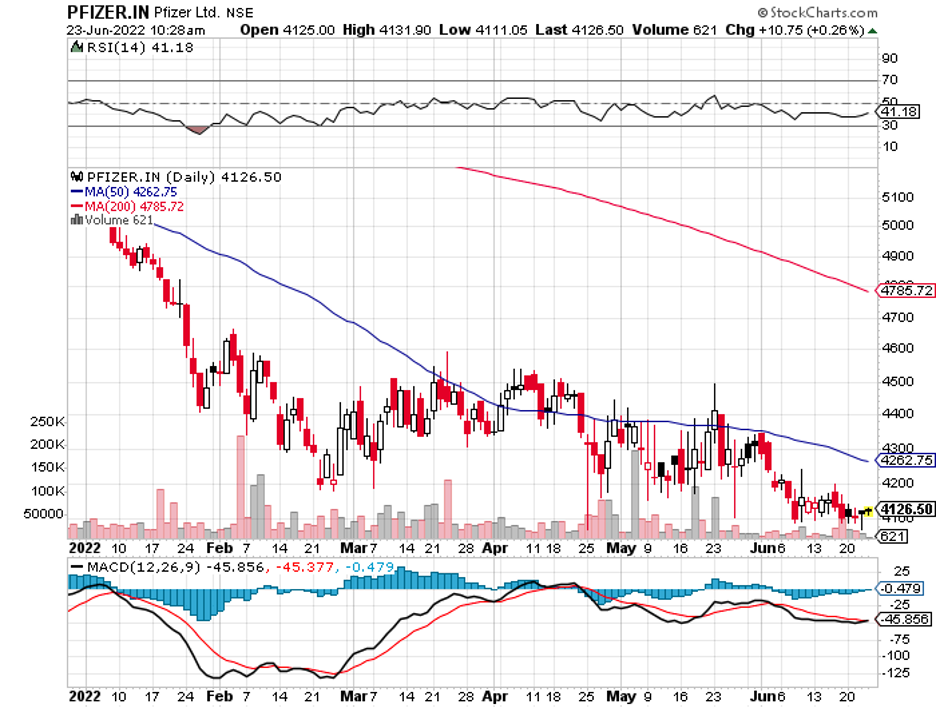An A-Rated Stock for the Anxious Investor
Choosing businesses with size and scale in their favor is more often than not a wise move for investors.
After all, these companies tend to be well established in their respective fields and hold a higher chance than their peers in terms of sticking around for a long time.
Pfizer (PFE) is an excellent example of a mature biopharmaceutical stock that could efficiently deliver great rewards to investors for many years.
However, the elephant in the room for this stock is whether the bumper profits from its COVID-19 vaccines will be sustained in the long term. These concerns have kept a lid regarding the company’s valuation.
If we strip out Comirnaty from the conversation, Pfizer will still have a decent valuation in relation to its share price today.
It has a current P/E of 11x and market capitalization to operating cash flows of 8.9x. In contrast, fellow vaccine maker AstraZeneca (AZN) has been trading at a negative P/E and a stressful market cap to operating cash flow of 27 times.
For added context, Big Pharma names Merck (MRK)’s P/E is 17x while Novo Nordisk (NVO) has been trading 37 times.
Going back to Pfizer, the company’s first-quarter earnings results for 2022 indicated a strong performance and reinforced its guidance this year.
For the full year of 2022, the company projects sales within the range of $98 billion to $102 billion.
To offer you a better picture of the scale of this growth, this would amount to 150% times the yearly sales between 2018 and 2020
It would actually be a quarter higher than the 2019 and 2020 sales combined.
If this roughly $100 billion forecast is achieved, Pfizer will become the first-ever pharmaceutical stock to reach that goal.
To put this in perspective, if we consider Pfizer as a country or a territory, then its GDP would be ranked 64th globally.
This would put it above Ethiopia and immediately behind Puerto Rico.
During this period, Pfizer recorded $25.7 billion in revenue, showing off an impressive 82% operational growth rate year-over-year and a 76% EPS growth.
Comirnaty, co-created with BioNTech (BNTX), raked in $13.2 billion, reporting a 282.1% spike for Pfizer
Meanwhile, the newly launched COVID-19 treatment, Paxlovid, generated $1.5 billion in revenue.
Pfizer’s consistent exponential growth, as shown in the first-quarter earnings, isn’t solely dependent on its COVID vaccines.
While Comirnaty and Paxlovid comprised over 50% of the $25 billion revenue in that period, sales from other segments continued to rise.
For example, stroke and blood clot treatment Eliquis generated $1.8 billion, up by 12% from its 2021 first-quarter sales of $1.2 billion. Meanwhile, heart failure treatment Vyndamax jumped by an impressive 41% to hit $612 million.
On top of its solid drug development pipeline, Pfizer has been leveraging its bumper cash flow to pursue bolt-on acquisitions of promising biopharmas.
Just last month, Pfizer acquired Biohaven Pharmaceuticals for $11.6 billion in cash. The smaller company’s primary treatment is Rimegepant, a migraine medication approved in both the US and Europe.
Aside from that, Pfizer threw its weight behind a fellow COVID vaccine maker, a French biotechnology company called Valneva (VLA).
Valneva’s most promising program is its late-stage development of a vaccine for Lyme disease.
When Pfizer announced its decision to add $95.6 million to the project plus up to $100 million in milestone payments, it triggered a massive 81% surge in Valneva stock price.
Pfizer and Valneva’s partnership for developing a Lyme disease vaccine started in 2020 when the bigger biopharma paid $130 million upfront.
This latest revision of their deal will not only up Pfizer’s stake in Valneva to 8.1% but also allow the French biotech to continue with its Phase 3 trial without the fear of straining its cash position.
Pfizer currently holds a distinct position in its history, with gushers of cash coming practically from all places.
These sums can only be expected to go higher with the anticipated listing of its consumer healthcare business, which it co-owns with GlaxoSmithKline (GSK). While there’s no official word yet on the deal, Pfizer’s plan to sell its stake could generate roughly $19 billion.
Moreover, the company maintains a respectable dividend yield of 3% and a net debt of roughly $10 billion, which can be completely paid off using its operating cashflows for three to four months.
This enables Pfizer to sustain a comfortable credit rating of “A” Stable from Fitch, thereby making it financially stable and safe from the ever-increasing interest rates.
Needless to say, Pfizer is the kind of stock that offers rare stability in this turbulent period.

